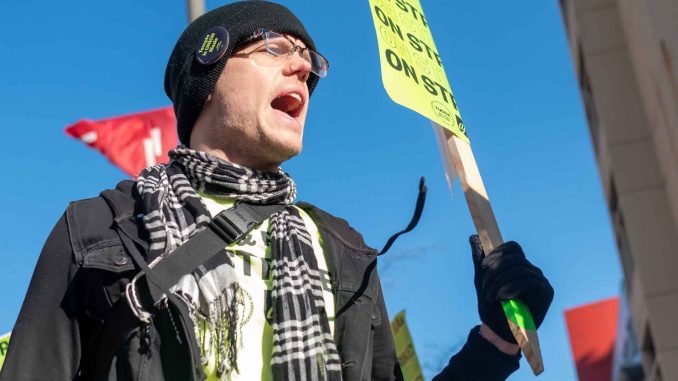
As Temple University Graduate Students’ Association members continue striking following their rejection of a tentative agreement with the university, some non-striking members believe their voices aren’t being heard.
Non-striking students feel TUGSA leadership has been unaccepting of members who continue to work, while excluding international students and marginalized groups from the decision making and bargaining processes.
Mitch Perkins, a third-year communications graduate student, served on TUGSA’s contract negotiation team for approximately six months last year. Now, Perkins remains in the classroom, upset with the union’s lack of inclusion for marginalized voices.
Perkins began attending meetings and eventually, to their surprise, was asked to serve on TUGSA’s contract negotiations team, even without prior labor organizing experience.
“It sort of felt to me like I was a queer token to put on the table,” said Perkins, a research assistant and instructor in Klein this semester.
Perkins accepted the role but didn’t have a lot to say in meetings, except for emphasizing the need for caucuses — spaces for specific groups within TUGSA, especially for Black, queer and international students — but their suggestion was always shut down by union leadership.
Manasa Gopakumar, an international member of TUGSA’s bargaining team and a doctoral candidate in philosophy, said the union has had an international student caucus since Spring 2020 amid COVID-19 travel restrictions.
TUGSA also has two international students on the contract team, three or four as strike captains and one-third of the bargaining unit is international students, Gopakumar added.
Many of TUGSA’s proposals focus on improved conditions specifically for international graduate workers, said Bethany Kosmicki, who is part of the union’s contract negotiations team.
“TUGSA seeks to be as inclusive as possible and we are always looking to represent and hear the voices of all the people basically we represent,” Kosmicki said.
Perkins believes TUGSA must recognize that some people are disproportionately impacted by Temple’s actions, like terminating striking members’ pay, tuition remission and benefits.
“These are people who have been members, they have been paying their dues, they have been coming to meetings, but just cannot strike and they shouldn’t be made to feel like they are not working in solidarity with the union when they’ve been around this whole time,” Perkins said.
Temple also warned international students about potential visa problems if they chose to strike, said a doctoral student in the Klein College of Media and Communication who spoke on the condition of anonymity to avoid potential retaliation from TUGSA.
Leading up to the strike, TUGSA leadership sent emails to members pressuring them to strike, regardless of financial or citizenship status, she said. Since the start of the strike, she added that there has been a growing tension between the two groups, leaving some strikers feeling betrayed or disappointed.
From her first semester at Temple, before the strike started, a non-striking second-year doctoral communication student who was also granted anonymity, noticed a majority of TUGSA members are white and lack consideration for students of color. There were issues, like lack of representation within graduate programs, that weren’t included in negotiations with Temple, she said.
“I think those of us who already felt dismissed felt further out of the loop and further just not involved, like this didn’t feel like our fight,” the student said. “And for international students, they had a lot of concerns rightfully about deportation and paperwork and visas and permits that weren’t addressed clearly.”
When the student decided not to strike, she and other union members received pushback from TUGSA, including disrespectful and dismissive texts, and were made to feel guilty by striking members.
“A lot of this rhetoric is coming from white students who don’t really understand what it’s like to really, really, really have to deal with extreme oppressive systemic issues,” she said.
The student said that TUGSA and her strike leader blocked her on Instagram and removed her from email communications, despite being an active member.
Conversations between members is normal, but it’s not standard practice for TUGSA to block anyone that is represented in the bargaining unit, and Kosmicki is unaware of any instance of it happening.
While the second-year student is shocked and empathetic for striking members who lost their tuition, she said the majority of the union is disconnected.
“A lot of us feel more vulnerable, and just don’t feel connected to the union and the issues, and just don’t feel like our struggles are prioritized,” the student said. “And I don’t think that that sentiment has changed any.”
Julia Merola contributed reporting.


Be the first to comment